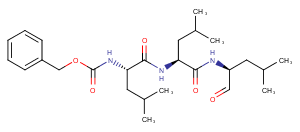MG-132
| Code | Size | Price |
|---|
| TAR-T2154-10mg | 10mg | £104.00 | |||||||||||||||||||||||||||||||||||||||||||||||||||||||||||||||||||||||||||||||||||||||||||||||||
| Special offer! Add £1 to your order to get a TargetMol CCK-8 Kit. Read more here. | |||||||||||||||||||||||||||||||||||||||||||||||||||||||||||||||||||||||||||||||||||||||||||||||||||
Quantity:
| TAR-T2154-1mL | 1 mL * 10 mM (in DMSO) | £109.00 | |||||||||||||||||||||||||||||||||||||||||||||||||||||||||||||||||||||||||||||||||||||||||||||||||
| Special offer! Add £1 to your order to get a TargetMol CCK-8 Kit. Read more here. | |||||||||||||||||||||||||||||||||||||||||||||||||||||||||||||||||||||||||||||||||||||||||||||||||||
Quantity:
| TAR-T2154-25mg | 25mg | £137.00 | |||||||||||||||||||||||||||||||||||||||||||||||||||||||||||||||||||||||||||||||||||||||||||||||||
| Special offer! Add £1 to your order to get a TargetMol CCK-8 Kit. Read more here. | |||||||||||||||||||||||||||||||||||||||||||||||||||||||||||||||||||||||||||||||||||||||||||||||||||
Quantity:
| TAR-T2154-50mg | 50mg | £189.00 | |||||||||||||||||||||||||||||||||||||||||||||||||||||||||||||||||||||||||||||||||||||||||||||||||
| Special offer! Add £1 to your order to get a TargetMol CCK-8 Kit. Read more here. | |||||||||||||||||||||||||||||||||||||||||||||||||||||||||||||||||||||||||||||||||||||||||||||||||||
Quantity:
| TAR-T2154-100mg | 100mg | £254.00 | |||||||||||||||||||||||||||||||||||||||||||||||||||||||||||||||||||||||||||||||||||||||||||||||||
| Special offer! Add £1 to your order to get a TargetMol CCK-8 Kit. Read more here. | |||||||||||||||||||||||||||||||||||||||||||||||||||||||||||||||||||||||||||||||||||||||||||||||||||
Quantity:
| TAR-T2154-200mg | 200mg | £389.00 | |||||||||||||||||||||||||||||||||||||||||||||||||||||||||||||||||||||||||||||||||||||||||||||||||
| Special offer! Add £1 to your order to get a TargetMol CCK-8 Kit. Read more here. | |||||||||||||||||||||||||||||||||||||||||||||||||||||||||||||||||||||||||||||||||||||||||||||||||||
Quantity:
| TAR-T2154-500mg | 500mg | £470.00 | |||||||||||||||||||||||||||||||||||||||||||||||||||||||||||||||||||||||||||||||||||||||||||||||||
| Special offer! Add £1 to your order to get a TargetMol CCK-8 Kit. Read more here. | |||||||||||||||||||||||||||||||||||||||||||||||||||||||||||||||||||||||||||||||||||||||||||||||||||
Quantity:
Prices exclude any Taxes / VAT
Overview
Regulatory Status: RUO
Shipping:
cool pack
Storage:
-20℃
Images
Documents
Further Information
Bioactivity:
MG-132 is a potent cell-permeable 26S proteasome inhibitor (IC50: 100 nM). It also inhibits calpain (IC50: 1.2 μM).
Biological Applications:
The 26S proteasome maintains cellular protein homeostasis by clearing abnormal, aging, or excessive proteins. It participates in the regulation of cellular life cycles, stress responses, and metabolic regulation, among other physiological processes. MG-132, as an inhibitor of the 26S proteasome, can disrupt the normal function of this system, providing important tools and information for research in cell biology and molecular biology. Additionally, the apoptosis of cancer cells is closely related to the activity of the ubiquitin-proteasome pathway. MG132 can induce cell apoptosis through various intermediate pathways, playing a crucial role in anti-tumor therapy.
CAS:
133407-82-6
Formula:
C26H41N3O5
Long Description:
MG-132, also known as Z-LLL-al or Z-Leu-Leu-Leu-CHO, is a 26S proteasome inhibitor with an IC50 of 100 nM. It exhibits cell permeability and reversibility. MG-132 is capable of inducing apoptosis.
Mechanism of Action:
The 26S proteasome is one of the most important protein degradation systems in cells, also known as the Ubiquitin-Proteasome System (UPS). This system mainly consists of two parts: the ubiquitination system and the proteasome. Ubiquitination system: This system involves the covalent attachment of ubiquitin molecules to target proteins, marking these proteins as targets for degradation. This process involves ubiquitin-activating enzymes and ubiquitin-conjugating enzymes, which work together to attach ubiquitin to specific proteins, forming polyubiquitin chains. Proteasome: This system is mainly composed of 20S core particles and 19S regulatory particles that bind to them, forming a 26S complex. The 26S proteasome is the primary intracellular protease responsible for degrading proteins that have been tagged with ubiquitin. It plays a crucial role in maintaining the quality of intracellular proteins and regulating protein levels by recognizing, deconstructing, and degrading ubiquitinated proteins.
Molecular Weight:
475.63
Pathway:
Ubiquitination; Autophagy; Proteases/Proteasome; Apoptosis
Purity:
0.98
Research Area:
Epigenetics, regulation of gene expression and cell division, proliferation, molecular biology
SMILES:
CC(C)C[C@H](NC(=O)[C@H](CC(C)C)NC(=O)[C@H](CC(C)C)NC(=O)OCc1ccccc1)C=O
Target:
Apoptosis; Proteasome; Autophagy
References
1. Tsubuki S, et al. Differential inhibition of calpain and proteasome activities by peptidyl aldehydes of di-leucine and tri-leucine. J Biochem. 1996 Mar;119(3):572-6.
10. Luo Q, Wu X, Zhao P, et al. OTUD1 Activates Caspase?Independent and Caspase?Dependent Apoptosis by Promoting AIF Nuclear Translocation and MCL1 Degradation[J]. Advanced Science. 2021: 2002874.
2. Braun HA, et al. Tripeptide mimetics inhibit the 20 S proteasome by covalent bonding to the active threonines. J Biol Chem. 2005 Aug 5;280(31):28394-401.
3. Han YH, et al. The effect of MG132, a proteasome inhibitor on HeLa cells in relation to cell growth, reactive oxygen species and GSH. Oncol Rep. 2009 Jul;22(1):215-21.
4. Chen B, et al. MG132, a proteasome inhibitor, attenuates pressure-overload-induced cardiac hypertrophy in rats by modulation of mitogen-activated protein kinase signals. Acta Biochim Biophys Sin (Shanghai). 2010 Apr;42(4):253-8.
5. Caron AZ, et al. The proteasome inhibitor MG132 reduces immobilization-induced skeletal muscle atrophy in mice. BMC Musculoskelet Disord. 2011 Aug 15;12:185.
6. Matsumoto Y, et al. Enhanced efficacy against cervical carcinomas through polymeric micelles physically incorporating theproteasome inhibitor MG132. Cancer Sci. 2016 Jun;107(6):773-81.
7. Harhouri K, et al. MG132-induced progerin clearance is mediated by autophagy activation and splicing regulation. EMBO Mol Med. 2017 Sep;9(9):1294-1313.
8. Guzm?n-T?llez P, Mart?nez-Valencia D, Silva-Olivares A, et al. Naegleria fowleri and Naegleria gruberi 20S proteasome: identification and characterization[J]. European Journal of Cell Biology. 2020: 151085



